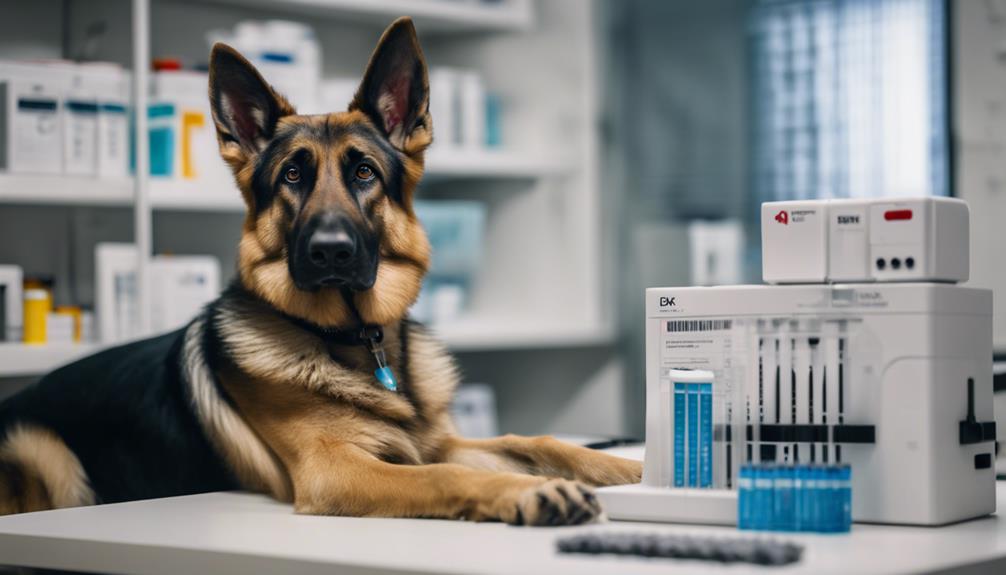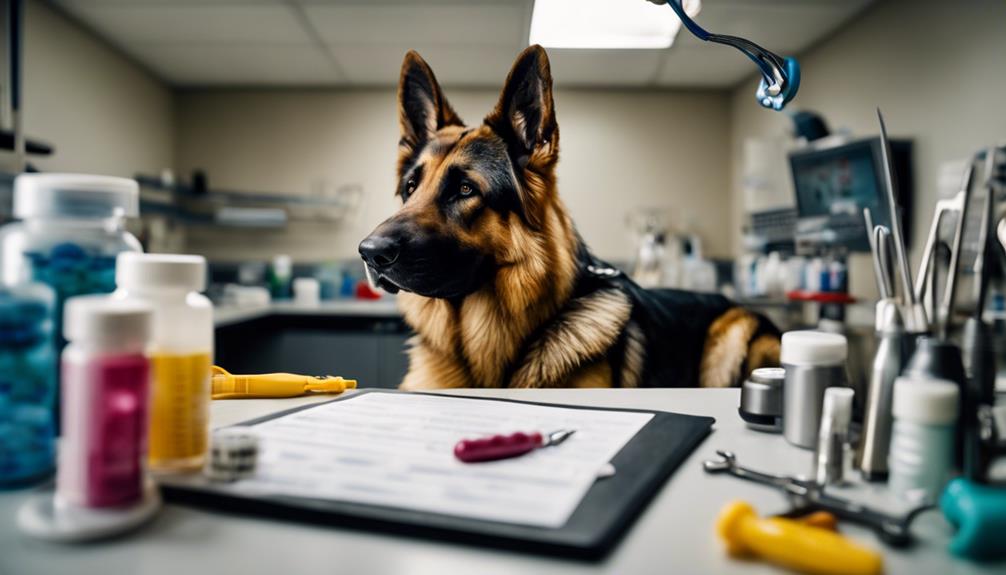🐾 Paw-some Partnership Alert! 🐾
As a pack of German Shepherd enthusiasts at MixGermanShepherd.com, we're always sniffing out the best products for our furry friends. Guess what? When you fetch something from Amazon through our links, we earn a little treat! 🦴
When it comes to the reproductive health of German Shepherd mixes, understanding the potential genetic predispositions is key. Factors like breed-specific health issues and selective breeding practices can significantly impact the well-being of these dogs. Exploring how these aspects influence the overall reproductive health of German Shepherd mixes can provide valuable insights into proactive care and management strategies that are essential for ensuring their long-term health and happiness.
Key Takeaways
- Genetic predispositions impact reproductive health in German Shepherd mixes
- Responsible breeding practices can reduce hip dysplasia incidence
- Spaying and neutering offer health benefits and behavioral improvements
- Regular veterinary care and genetic testing optimize reproductive health
Common Reproductive Health Issues

German Shepherd mixes commonly face inherited reproductive health challenges that stem from their parent breeds. One prevalent issue in German Shepherd mixes is hip dysplasia. This condition occurs when the hip joint doesn't fit properly into the socket, leading to discomfort, lameness, and even arthritis in severe cases. Hip dysplasia can be debilitating for these dogs, affecting their mobility and overall quality of life.
To address hip dysplasia in German Shepherd mixes, it is crucial for breeders and owners to be aware of the genetic predisposition to this condition. Health screening and testing can help identify dogs at risk, enabling proactive measures to be taken. Responsible breeding practices play a key role in reducing the incidence of hip dysplasia in future generations of German Shepherd mixes. Early detection and proper management of this condition are essential for ensuring these dogs lead healthy and happy lives. By staying informed and proactive, you can help safeguard the well-being of your German Shepherd mix and mitigate the impact of hip dysplasia.
Spaying and Neutering Considerations

When considering spaying or neutering your German Shepherd mix, it's crucial to understand the health benefits associated with these procedures. Spaying can help prevent certain health issues like mammary tumors, while neutering can reduce aggressive behavior. Discussing the optimal timing for spaying or neutering with your veterinarian is essential for the well-being of your pet.
Health Benefits of Spaying/Neutering
Spaying or neutering your German Shepherd mix can significantly reduce the risk of certain cancers and behavioral issues while also preventing unwanted litters and potential health complications. Spaying eliminates the chances of mammary cancer in females, while neutering lowers the risk of testicular cancer in males. Additionally, these procedures can curb behavioral problems like roaming, aggression, and territory marking. Check out the table below for a summary of the health benefits of spaying and neutering in German Shepherd mixes:
| Health Benefits of Spaying/Neutering |
|---|
| Reduces cancer risks for females (mammary) and males (testicular) |
| Prevents behavioral issues like roaming and aggression |
| Eliminates the heat cycle in females, avoiding unwanted litters |
| Lowers the chances of prostate problems in males |
| Recommended by veterinarians for long-term health benefits |
Consider these points when deciding on spaying or neutering your German Shepherd mix for their overall well-being.
Timing for the Procedure
Considering the ideal age for spaying or neutering your German Shepherd mix is crucial for maximizing health benefits while minimizing potential risks. When it comes to spaying female dogs, the following points should be taken into account:
- Mammary Tumor Risk: Spaying before the first heat cycle significantly reduces the chances of developing mammary tumors.
- Consult a Vet: It's advisable to consult with a veterinarian for personalized advice on the optimal timing for spaying your female German Shepherd mix.
- Bone Development Impact: Early spaying can affect growth plate closure, potentially impacting the bone development of your dog.
Discussing the timing for the procedure with a vet will help you make an informed decision balancing the benefits and risks.
Pregnancy and Whelping Care

When preparing for the arrival of German Shepherd mix puppies, understanding the importance of prenatal care is crucial. Monitoring your dog closely for signs of labor and ensuring a comfortable whelping area are key aspects of whelping care. Once the puppies arrive, knowing how to care for the newborns properly is essential for their health and well-being.
Prenatal Care Essentials
Proper prenatal care is essential for ensuring the health and well-being of German Shepherd mix mothers and their developing puppies. To provide the best care during this crucial time, follow these key steps:
- Regular Veterinary Check-ups: Schedule routine visits to monitor the mother's health and detect any potential pregnancy complications early on.
- Balanced Nutrition and Prenatal Vitamins: Ensure the mother receives a diet rich in nutrients and consider prenatal vitamins to support her and the puppies' growth.
- Understanding Gestation Period: With an average gestation period of 63 days, knowing this timeline helps you prepare for the upcoming whelping process and delivery smoothly.
Labor and Delivery
To ensure a smooth transition from prenatal care to labor and delivery for German Shepherd mix mothers, focus on recognizing early signs of labor and preparing a comfortable whelping environment. German Shepherd mixes typically have a gestation period of around 63 days. During labor, which can last between 6 to 12 hours, signs such as restlessness, nesting behavior, and a drop in body temperature indicate the imminent arrival of puppies. It's crucial to monitor the mother's progress closely and be prepared to assist with the delivery if necessary. Providing a quiet, warm, and safe space for whelping is essential for the well-being of both the mother and her puppies during this critical period. Remember, proper care during labor and delivery sets the foundation for a healthy first year of life for the puppies.
Newborn Puppy Care
Monitoring the mother's health and behavior during pregnancy is crucial for ensuring the well-being of both her and the newborn puppies. To provide the best care for newborn German Shepherd Dog (GSD) mixes, follow these essential steps:
- Proper Nutrition and Veterinary Check-ups: Ensure the mother receives the necessary nutrients and regular vet visits for a healthy pregnancy.
- Understanding the Whelping Process: Recognize signs of labor and prepare a safe, comfortable whelping box for the mother and puppies.
- Immediate Newborn Care: Clear the puppies' airways, keep them warm, and monitor for successful nursing to promote their well-being from the start.
Breeding Best Practices

Genetic testing and a thorough understanding of the parent breeds' hereditary traits are essential for ensuring responsible breeding practices for German Shepherd mixes. By conducting health screening tests like OFA and genetic testing before breeding, you can identify potential health issues and work towards producing healthier offspring. Knowing the hereditary traits and health concerns of the parent breeds allows you to make informed decisions to prevent passing down genetic diseases.
Breeding German Shepherd mixes after they reach at least 2 years old is recommended to ensure the health and well-being of the puppies. This age guideline helps minimize the risk of health complications in both the mother and the offspring. Lara's Canine Solutions underlines the importance of health screening and responsible breeding practices for German Shepherd mixes, advocating for the well-being of the parent dogs and their future litters. Following these best practices not only promotes healthier puppies but also contributes to maintaining the overall well-being of the breed.
Genetic Testing Importance

Why is genetic testing crucial for ensuring the health and well-being of German Shepherd mixes? Genetic testing plays a vital role in safeguarding the health of German Shepherd mixes by providing valuable insights into their genetic composition. Here's why genetic testing is of utmost importance:
- Identifying Potential Health Issues: Genetic testing helps uncover any potential health conditions inherited from the parent breeds, allowing for early intervention and management.
- Guiding Breeding Decisions: Understanding the genetic makeup through testing aids breeders in making informed decisions, preventing the transmission of hereditary diseases to future generations.
- Promoting Responsible Breeding Practices: By utilizing genetic testing, breeders can uphold responsible breeding practices, ensuring the overall health and well-being of German Shepherd mixes for generations to come.
Reproductive Health Maintenance

To ensure the continued well-being of your German Shepherd mix, maintaining reproductive health through regular veterinary check-ups and proper care is paramount. Regular veterinary check-ups are crucial for monitoring the reproductive health of your German Shepherd Dog (GSD) mix. These visits allow for early detection of any potential issues, ensuring prompt intervention and treatment. Alongside veterinary care, proper nutrition and regular exercise are essential in maintaining optimal reproductive health in GSD mixes. By providing a balanced diet and keeping your dog active, you can support their overall well-being and reproductive function.
Being aware of common reproductive issues in German Shepherds, such as hip dysplasia, is also vital for GSD mixes. Understanding the breeding history and genetic predispositions of your dog can help in addressing specific reproductive health concerns. By staying informed and proactive, you can prevent and manage potential problems effectively. Early detection of reproductive health issues, including fertility problems or genetic disorders, is key to ensuring the best outcomes for your German Shepherd mix. Regular care and attention to your GSD mix's reproductive health can contribute to a long and healthy life.
Frequently Asked Questions
Do German Shepherd Mixes Have Health Problems?
You should know that health concerns can be present in German Shepherd mixes due to potential inherited issues. Regular check-ups and screenings are crucial for early detection. Responsible breeding practices can help reduce the occurrence of health problems.
What Is the Best Breed to Mate With German Shepherd?
When considering breeding recommendations for your German Shepherd, prioritize health, temperament, and physical compatibility. Popular breeds like Golden Retrievers and Labrador Retrievers can produce healthier mixed-breed puppies. Choose wisely for desired traits in offspring.
What Are the Genetic Problems With German Shepherds?
When it comes to genetic problems in German Shepherds, it's like navigating a genetic maze. Genetic testing is key to uncovering issues like hip dysplasia and degenerative myelopathy, enabling you to make informed decisions for your furry companion.
Should I Breed My Female German Shepherd?
You shouldn't breed your female German Shepherd without careful consideration. Ensure she's at least 2 years old for physical and emotional maturity. Breeding past 8 can pose health risks. Responsible breeding practices are crucial for her and the puppies' well-being.
Conclusion
In conclusion, ensuring the reproductive health of German Shepherd mixes is crucial for their overall well-being. By addressing common issues, making informed decisions about spaying and neutering, providing proper care during pregnancy and whelping, following breeding best practices, and utilizing genetic testing, you can help maintain the long-term health and vitality of these beloved dogs. Think of it as tending to a garden – with proper care and attention, you can cultivate a beautiful and healthy result.
